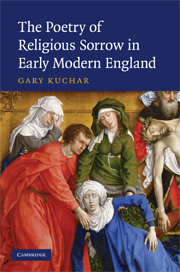Book contents
- Frontmatter
- Contents
- Acknowledgments
- Abbreviations and notes on texts
- Introduction: Of Sighs and Tears
- Chapter 1 The poetry of tears and the ghost of Robert Southwell in Shakespeare's Richard II and Milton's Paradise Lost
- Chapter 2 The poetry of tears and the metaphysics of grief: Richard Crashaw's “The Weeper”
- Chapter 3 The poetry of tears and the metaphysics of grief: Andrew Marvell's “Eyes and Tears”
- Chapter 4 Sad delight: Theology and Marian iconography in Aemilia Lanyer's Salve Deus Rex Judaeorum
- Chapter 5 Petrarchism and repentance in John Donne's Holy Sonnets
- Chapter 6 John Donne and the poetics of belatedness: Typology, trauma, and testimony in An Anatomy of the World
- Conclusion
- Index
- References
Chapter 6 - John Donne and the poetics of belatedness: Typology, trauma, and testimony in An Anatomy of the World
Published online by Cambridge University Press: 22 September 2009
- Frontmatter
- Contents
- Acknowledgments
- Abbreviations and notes on texts
- Introduction: Of Sighs and Tears
- Chapter 1 The poetry of tears and the ghost of Robert Southwell in Shakespeare's Richard II and Milton's Paradise Lost
- Chapter 2 The poetry of tears and the metaphysics of grief: Richard Crashaw's “The Weeper”
- Chapter 3 The poetry of tears and the metaphysics of grief: Andrew Marvell's “Eyes and Tears”
- Chapter 4 Sad delight: Theology and Marian iconography in Aemilia Lanyer's Salve Deus Rex Judaeorum
- Chapter 5 Petrarchism and repentance in John Donne's Holy Sonnets
- Chapter 6 John Donne and the poetics of belatedness: Typology, trauma, and testimony in An Anatomy of the World
- Conclusion
- Index
- References
Summary
If “Since She Whome I Lovd” enacts the impossibility of writing a Petrarchan elegy in the wake of Reformation soteriology, then An Anatomy of the World. The First Anniversary does something similar but on a scale that is both formally and thematically much grander. Where the beloved's death in “Since She Whome I Lovd” instigates a personal crisis of mourning and conversion for the speaker, the death of Elizabeth Drury in the 1611 elegy instigates a crisis of mourning and regeneration for the entire world. In An Anatomy, Drury's death is presented as having annulled all possible forms of sacramentalization – dividing asunder all “commerce twixt heaven and earth” (399). In the process of mourning this desacralization, Donne's elegy exemplifies how questions about the experience of testimony are often posed in and articulated through the language of religious sorrow. Just as Peter's experience of bearing witness to Christ and Herbert's experience of searching for God occur by their understanding how their sorrow speaks to them of an other within themselves, so Donne's attempt to bear witness to the spirit of his would-be patron's daughter unfolds as an anatomy of the world's melancholy.
At the furthest level of generality, An Anatomy presents itself as an effort to assimilate the significance of Drury's untimely death into the meta-narrative of Christian history.
- Type
- Chapter
- Information
- The Poetry of Religious Sorrow in Early Modern England , pp. 184 - 215Publisher: Cambridge University PressPrint publication year: 2008

